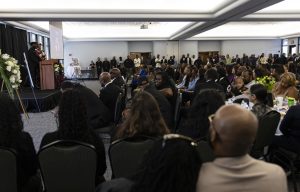Literary journal accepting submissions
September 12, 2001
Sacramento State?s student literary journal, Calaveras Station, is accepting submissions through Oct. 31 for its 5th annual edition.
The journal features various genres such as poetry, drama, critical analysis, expository prose, fiction and non-fiction, said Editor Jennifer Wingard. Both undergraduate and graduate students are welcome to submit.
” Basically any type of editions are accepted for publication,” Wingard said.
Though some students may think submitting to the journal is limited to English majors, anyone and everyone taking classes at Sac State is encouraged to turn in their work, said faculty adviser Joshua McKinney.
“Just because you are not an English major, does not mean that you cannot submit a piece of writing,” McKinney said. “It is campus-wide, for everyone, and that means that students from different disciplines are encouraged to submit.”
Student Norine Radaikin, who is working on the journal?s editorial staff this semester, said she appreciates having a creative outlet for hers and other students? writing.
” It’s a great way to go,” Radaikin said. “It is heartening to be part of a university and an English department that is supportive of its students? creativity.”
Each year, more and more articles are submitted, and the quality of writing has risen. McKinney said. Last year the journal received more than 200 submissions, and ran more than 200 pages in length.
“Last year?s journal was the biggest issue yet, and it is no joke to say that this format, being perfectly bound and not stapled, looks better than most national journals,” McKinney said.
The size of the journal depends on many factors, such as the number of submissions received and how competitive the judging is, McKinney said.
“But the more that students hear about the journal, the more students submit to it,” McKinney said.
Since Calaveras Station is student-run, students will judge each submission. Wingard, along with other editors who specialize in each specific field of writing, will read each article, and then meet with advisers McKinney and Doug Rice to discuss each submission.
“We accept 50-100 pieces of writing, depending on the quality of the work,” Wingard said. “As the years have passed, the quality of work has risen tremendously. This year we anticipate over 300 submissions and for the judging process to be extremely competitive.”
Though not every submission makes the final cut, students who turn in work can gain valuable feedback about their writing, Radaikin said.
” I have had a poem accepted for inclusion in both Vol. 2 and Vol. 4 of Calaveras Station, but I have also received a rejection of my submission to Vol. 3,” Radaikin said.
“Unfortunately, rejection is a part of every writer’s life ? sometimes too great a part, but I would definitely submit poems again for upcoming issues.”
Calaveras Station is sold for $10 during the spring Festival of the Arts week, a time where the College of Arts and Letters brings artistic people, such as dancers, artists and various speakers to campus.
“In conjunction with the Festival of the Arts, we are trying to include the art department in coordinating some graphics for our journal this year,” Wingard said. “Also, students will have the opportunity to read aloud their articles that have been published during this week.”
Wingard and McKinney hope that Calaveras Station will contribute to a greater sense of community on campus.
“We hope that since this is a journal for all of campus to enjoy, all (students on) campus will submit to it,” Wingard said. “This will be able to bring the campus together by allowing anyone from any field of study to submit a written piece and to get published.”
For more information on the submission process, call 278-6349 or go to Calaveras Hall, room 102.
























































































































